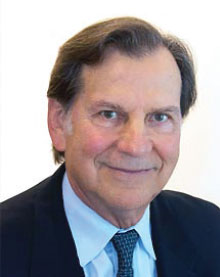Free, Online Resource Outlines Latest Suicide Research
Abstract
The recently updated Current Status of Suicide-Focused Assessment and Treatment document provides clinicians with a comprehensive overview of the latest in suicide research.
In what he calls his “gift to the profession,” Douglas Jacobs, M.D., has developed an extensive, free document that outlines the latest updates on almost all aspects of suicidology, including theory, research, and clinical practice recommendations.

“This is my way of giving back. ... I feel that the content of this document is very valuable to the profession.” —Douglas Jacobs, M.D.
Titled “Current Status of Suicide-Focused Assessment and Treatment: An Online Resource for Clinicians,” the document compiles and summarizes evidence from existing literature and includes links to articles that are publicly available. Jacobs said the document is not peer reviewed and is not meant to be construed as describing the standard of care.
“I’ve had a very blessed career, and this is my way of giving back,” Jacobs told Psychiatric News. “I feel that the content of this document is very valuable to the profession.” He is an associate professor of psychiatry at Harvard Medical School and a member of the McLean Hospital Suicide Advisory Committee. In 2001 he was appointed chair of the APA committee that developed the Practice Guideline for the Assessment and Treatment of Patients with Suicidal Behaviors.
Jacobs developed the document with his longtime collaborator, researcher Marci Klein-Benheim, Ph.D., director of research with Jacobs’s website, Stop A Suicide Today. He most recently updated the document in August and said he intends to revise it at least annually or following major clinical developments to ensure it includes the latest from the field. Further, the document has been reviewed by an advisory panel consisting of some of the leading figures in suicide research including Ross Baldessarini, M.D., Madelyn Gould, Ph.D., M.D., David A. Jobes, Ph.D., and Christine Moutier, M.D.
In addition to links to the most recent and relevant literature on suicidology, the document is supplemented by information presented by experts at the annual, free virtual workshop on suicide assessment and treatment hosted by McLean Hospital and the Stanford University Department of Psychiatry and Behavioral Sciences. Jacobs co-directs the event along with past APA President Alan Schatzberg, M.D. This year’s program is taking place on October 25. To register, go to https://home.mcleanhospital.org/ce-suicide.
Yeates Conwell, M.D., presented on assessing and treating suicide among older adults at the first virtual workshop in 2021. Materials from his presentation are included in the latest version of the document. Conwell is the director of the University of Rochester Medical Center Office for Aging Research and Health Services and co-director of the Center for the Study and Prevention of Suicide.
Comprehensive Resource
Conwell told Psychiatric News that the document is incredibly valuable. “It’s encyclopedic,” he said. “It’s a very impressive document that reflects input from many experts in this field. It’s difficult to maintain the quality of a compendium like this because there is quite a bit of ongoing research, but Dr. Jacobs has managed to do that remarkably well.”
Conwell pointed out that suicide touches numerous professions, which is why it’s so beneficial that the document is available to a multidisciplinary audience. Further, important research on suicide can be found in a variety of journals devoted to areas of study other than psychiatry, such as anthropology, epidemiology, and public health. “The value of this document lies in bringing that together as much as possible in one place and keeping it updated over time,” he said.
Related Efforts
Jacobs has dedicated his life not just to the study of suicide assessment and treatment, but also to public outreach for individuals experiencing depression or suicidal ideation. He developed the concept of large-scale mental health screening for mental disorders in the early 1990s and founded National Depression Screening Day. National Depression Screening Day, which is held every October, is supported by numerous mental health organizations, and encourages the inclusion of depression screening into routine care. He also created the SAFE-T (Suicide Assessment Five-step Evaluation and Triage), a guide that clinicians in emergency departments and inpatient units can use when they encounter patients at risk of suicide.
He created his website, Stop A Suicide Today (www.stopasuicide.org), to be a free resource for those at risk of suicide and their loved ones. In developing that website, Jacobs wanted to create a resource specifically for professionals, which led him to develop the “Current Status of Suicide-Focused Assessment and Treatment” along with Klein-Benheim.
Clinicians are increasingly asked to do more in their daily practice, Jacobs noted. “I work with suicidal patients myself, which makes me realize the complexity of our practice and appreciate the vast amount of useful clinical information that is available in evidence-based literature but is time consuming for the practicing clinician to easily access,” he said. “This document is a labor of love in an effort to help in that endeavor, and I do feel committed to making this available to everyone.” ■



